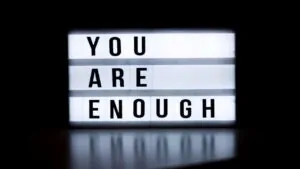What if You Were Always Enough?
by Robert Hackman
By Felicia Buitenwerf on Unsplash
Looking for some peace in me
I cannot find within a tv screen
Spiritual impurities
Tamper wholeheartedly
This should come as no surprise
Self-love to realize
I am enough
From the song ‘I Am Enough’
By Bruce C.
It was the simplest of group exercises. Yet its impact was significant. It involved pieces of paper with rudimentary mask drawings, pens, and a large paper bag.
The instructions from Connie Palmer, the expert designer and facilitator of the workshop ‘Shame the Master Emotion,’ were clear. She asked the participating men and women to write three sentences describing how others perceive them on the front and three lines on the back, sharing how they see themselves.
The completed papers were read aloud anonymously. The differences between the front and back of the sheets were both startling and universal. Participants felt they were perceived significantly more favorably by others than they perceived themselves. They judged themselves harshly, sometimes exceptionally so.
One message was overwhelmingly evident. We all feel shame.
I found the training so compelling; I have incorporated it into many of my facilitations with groups and teams, with excellent results. Invariably, it brings people closer together and increases trust. The process unveils the isolating illusion of shame.
Anonymity allows participants to be vulnerable. Sharing vulnerably with one another is how we connect. Even when they are anonymous, people proceed cautiously, which is not surprising.
Shame derives from the belief that a part of us is inherently and irreparably flawed and cannot be changed.
The pain of shame is sharp, deep, and threatening. It makes us feel we are not enough and unworthy of love and belonging. Thus, causing us to separate from ourselves and others.
That is why shame compels us to hide, put on a mask, and armor up to protect ourselves, making it easy to think you are the only one.
In this way, shame acts as the big stopper, which makes it so damaging to our relationships with ourselves and one another.
You can be sure that a person shaming others is feeling deep shame themselves. Hurt people, hurt people.
When shame is used deliberately as a weapon against others, it contaminates situations and environments, making them psychologically unsafe. It undermines and destroys the trust required for high-functioning teams, organizations, and communities.
We are all capable of shaming words and behaviors. If the shame is inadvertent (shame is determined by the person who feels it, even if it was unintended), it can be talked through and misunderstandings cleared.
You are not alone in feeling shame. You never have been. You are the same as others despite many pretending otherwise.
By acknowledging our humanity, we can begin to let our guard down. The more we accept and embrace all of ourselves, the less susceptible we are to being hurt by others. And the more accepting of others we become.
What would your life be like if you genuinely believed you were ‘enough?’ What would your family, team, and organization be like if they were filled with people who knew they were enough?
I believe it would create a world of people living their purpose full out, unshackled from the debilitating impact of the shame of believing they are not enough.
I find it fascinating to consider and a challenge to comprehend a slightly different take on what John Lennon envisioned in his song, ‘Imagine.’
Yes, you are imperfect, along with everyone else. You are enough because of humanness and vulnerabilities, not despite them.
My sincere desire is for you to let go of shame by sharing yourself vulnerably with others you trust and who care about you.
Doing so frees you up, helps you live and lead with fewer regrets, permitting others to do the same. I cannot think of anything more essential than that.
As my treasured friend, Tom Werder, frequently asks, ‘How free do you want to be?’
Worthy Inquiries:
- Do you believe you are the only one who experiences shame? Would it help to realize we all experience shame, even though some people feel it more than others?
- What would it take to accept that you are not alone in this way and never have been? Are you willing to acknowledge we connect through vulnerability?
- Do you believe sharing yourself with others you trust and who care about you helps you release shame and accept and embrace yourself more thoroughly?
- Do you accept that you are enough because of your humanness and vulnerabilities, not despite them? Do you feel closer to others when you share vulnerably with one another?
- What would your life be like if you genuinely believed you were enough? What would your family, team, organization, or community be like if they were filled with people who knew they were enough?
Please reach out to me to discuss how growing your leadership benefits you, your team, or your organization. I welcome the connection.
Robert Hackman, Principal, 4C Consulting and Coaching, helps people live and lead with fewer regrets. He grows and develops leaders through executive coaching consulting, facilitation, and training of individuals, teams, and organizations. He is committed to Diversity, Equity, and Inclusion. He facilitates trusting environments that promote uncommonly candid conversations. Rob is also passionate about the power of developing Legacy Mindsets and has conducted over 50 Legacy interviews with people to date.
A serious man with a dry sense of humor who loves absurdity can often be found hiking rocky elevations or making music playlists. His mixes, including Pandemic Playlists and Music About Men, among others, can be found on Spotify.
Bravely bring your curiosity to a conversation with Rob, schedule via voice or text @ 484.800.2203 or rhackman@4cconsulting.net.


